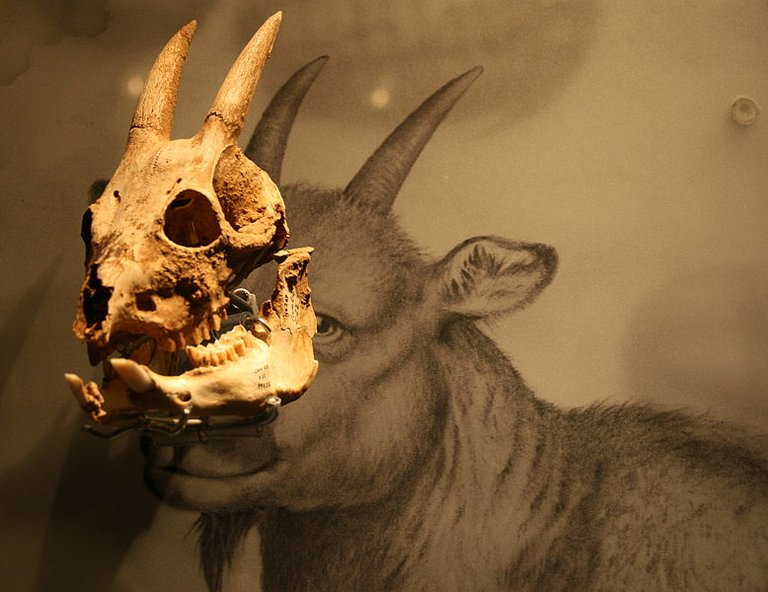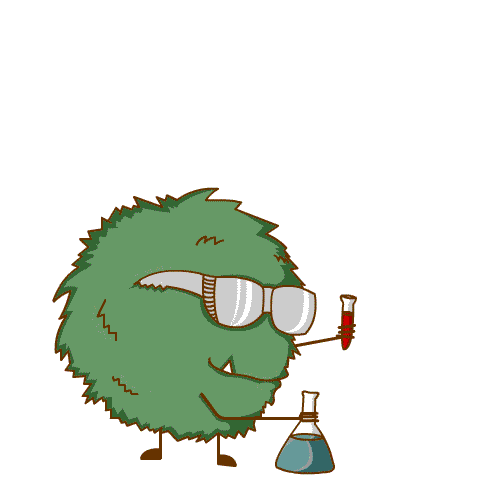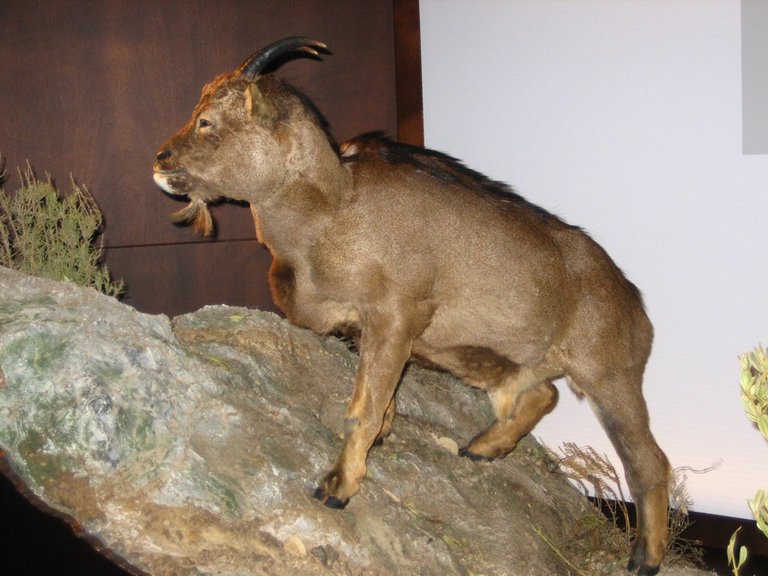The time is about 3000 B.C. and Neolithic humans arrive on a small Mediterranean island which will carry the name “Majorca” (or “Mallorca”) in the future.
The island is barren, animals that live here struggle to find a food source. For some time, the biggest mammals the humans that just arrived encounter are several types of shrew and mice. Until it appears, tiny, a bit clumsy but without fear: Myotragus balearicus, the Balearian mouse-goat.
By Xavier Vázquez 1
Today, we think that the arrival of humans was the death sentence for this special kind of goat. Totally isolated, it had been the victim of insular dwarfism caused by the lack of food. Missing any natural predators, it probably suffered a similar fate as the Dodo bird.
But what’s so special about this tiny goat?
For one, it looked slightly different from the goats we know today, mostly because of its teeth which gave the mouse-goat its name. The ever-growing incisor tooth is typical for rodents, not for goats and sheep. Additionally, it had front facing eyes like we do, which enabled 3D vision.

By Nachosan 2
But what is a lot more fascinating is the fact that the bones of this animal look a lot more like the ones of a reptile than of a mammal. Why?
Mammal bones show a constant growth, which comes with a constant need for food. Reptile bones, on the other hand, look similar to the cross section of a tree trunk, because they have a cyclic growth pattern. The mouse-goat shares this growth pattern.

By Biswarup Ganguly 3
This anomaly led several people to believe that the goats might have been cold-blooded. Were they? We can’t prove it but it's more likely that they just achieved a growth pattern similar to reptiles by adjusting their metabolism and growth to the hostile conditions.
Still, the thought that there might have a cold-blooded mammal 5000 years ago is pretty exciting. And who knows what evolution brings in the future?
Dwindling resources might force other mammals to evolve in a similar way, thousands or millions of years from now. It’s a shame we can’t stay and watch.
Sources:
Myotragus Balearicus, Extinction of Mouse-Goats
Mitochondrial DNA from Myotragus balearicus, an extinct bovid from the Balearic Islands
Goat Lived Like a Reptile -- A First
Picture Credit:
1 By Xavier Vázquez (Cosmo Caixa, Barcelona) [Public domain], via Wikimedia Commons
2
3 By Nachosan (Own work) [CC BY-SA 3.0 (http://creativecommons.org/licenses/by-sa/3.0)], via Wikimedia Commons By Biswarup Ganguly (Own work) [GFDL (http://www.gnu.org/copyleft/fdl.html) or CC BY 3.0 (http://creativecommons.org/licenses/by/3.0)], via Wikimedia Commons
Got a scientific topic which you want to see as a story? Leave me a comment!
Check out @steemstem and the #steemSTEM channel in steemit.chat and consider following the curation trail on Streemian to support scientists on steemit!


something cool
goat..
hahaha
Is super-weird. Even hibernating mammals don't have similar bone growth patterns. I'm calling dibs for cloning it and it is the devil.
Mouse-goat-reptile.
Like the pig-bear-man. Half pig, half bear, half man.
It'd be interesting to see how this goat actually lived, theories only go so far.
it'd would be even more interesting, to clone it just to see how it tastes like! It looks delicious!
Are you hungry? :D the Neolithic humans probably thought it tastes great
@trumpman got you a $1.25 @minnowbooster upgoat, nice! (Image: pixabay.com)
Want a boost? Click here to read more!
An upgoat has never been more appropriate than on this post about unique goats :)
very interesting, nice post.
an eye for an eye and a goat for a goat
That's really interesting. I wonder why it needed the 3D vision or if the change to the scull was just a weird side-effect of getting smaller. Could that be?
Well, the eyes are usually at thr side of the head to allow a greater field of vision. This allows prey animals to notice predators earlier.
With no predators present, there was no evolutionary need for this. 3D vision has certain advantages. As it seems enough advantages to be preferred by natural selection.
Or perhaps, it was the predator itself and it wears down its rodent-like teeth on the carcasses and bones of its prey.
To quote Tim the Enchanter: That's the most foul, cruel, and bad-tempered rodent you ever set eyes on!
Look, that rabbit's got a vicious streak a mile wide! It's a killer!
🤔 🐇
That is the quote, Tim the Enchanter should never be paraphrased.
lol :D
Very interesting post! I've never heard that story before - that's great! Thank you for sharing all the information about the mouse-goat with us :)
a very good post @suesa
Really good post! Thanks to share! (;
for a glimpse, his body looks sturdy. tough fighters
But really tiny and really clumsy
yeah @suesa i think so
cold blooded manmals...looks like the english language gotta change. We cant say you cold blooded animal anymore...
Interesting to know a reptile's bone is different from a normal mammal's bone. Makes me wonder...
What a fascinating article thank you
Following for more
good article.. something to think off :D
Wonderful post...learning from you as always....Thanks@suesa
I have followed you on Steemit, please be kind enough to follow me as well.
That's not how you get followers
cool post
Rodents of Unusual Size.
Fascinating... it would be interesting to compare the records to those found in other isolated places like the Galapagos Islands. Majorca is a pretty diverse island, though... mountains to near 5000 feet and "rainy" and "dry" mini climates... if it were cold blooded-ish, have to wonder if its extinction might have been tied to being a slow mover that was easily caught...
Steemit Bank invested in your post.
Follow Steimit Bank
die
Upvoted. Hahaha :)